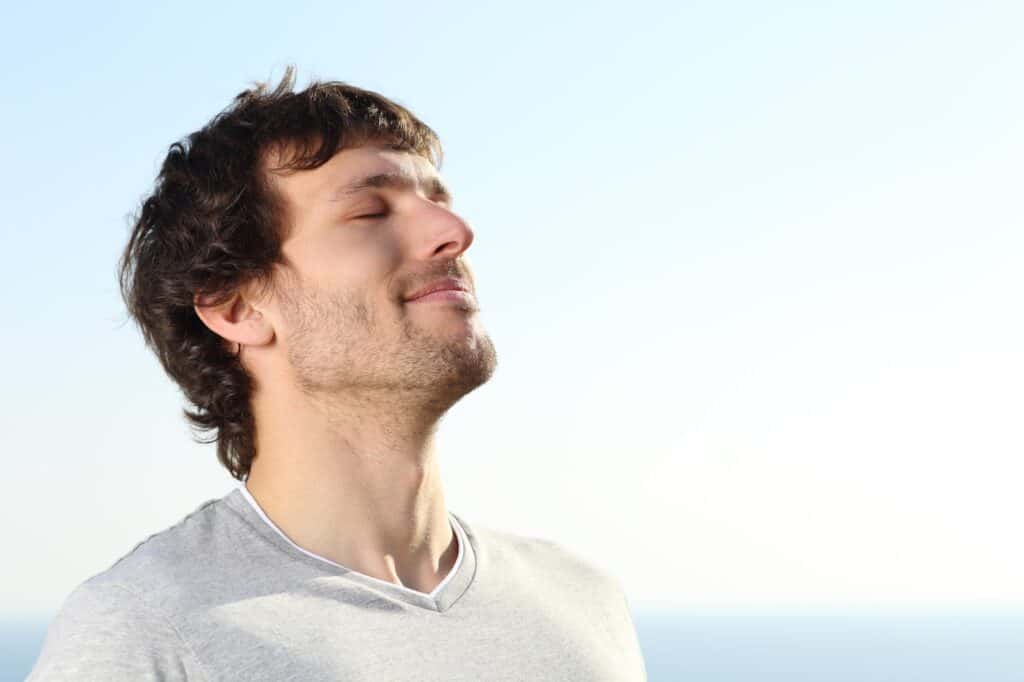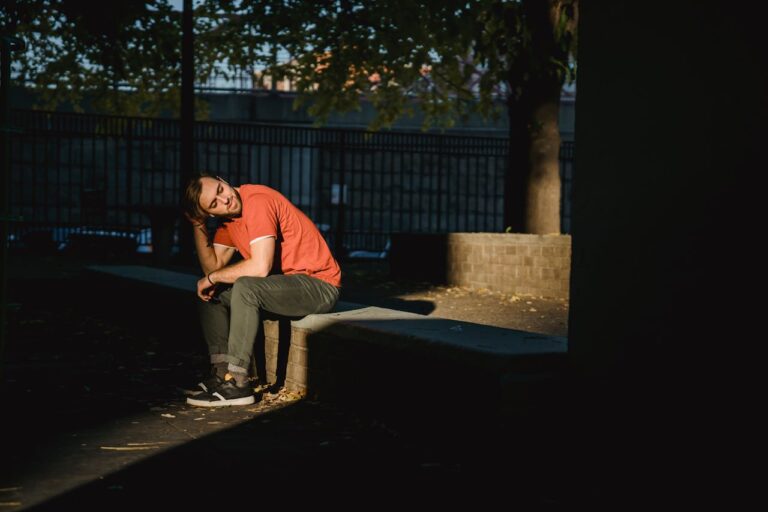
Have you ever considered that being truly alone in a bustling public space might be the ultimate test of self-assurance? This thought often runs counter to our instinct to seek companionship in such settings.
But visualize the liberating realization that there’s nothing wrong with enjoying your own company amidst a crowd. This journey towards embracing solitude publicly is an exercise in emotional maturity, a way to silence the inner critic that often questions our choice to be alone.
The secret to embracing your independence and feeling comfortable alone in public lies in understanding the root of your discomfort and learning the skills and tips to overcome it.
Digging deeper into this phenomenon, we’ll go over why you might feel awkward alone in public and share actionable strategies to help you build confidence and conquer any social situation with ease.
What is the fear of being alone in public?
The fear of being alone in public is commonly referred to as “autophobia” or “monophobia.” This fear is characterized by intense anxiety or dread at the thought of being alone, particularly in public spaces. It’s important to note that autophobia or monophobia can manifest in different ways for different individuals. For some, the fear may be specifically linked to being physically alone, while for others, it might be more about feeling isolated or disconnected from others, even in a crowd.
To further understand this, let’s examine some specific reasons why you may feel uneasy alone in public.
Why can being alone in public be uncomfortable?
Feeling awkward when you’re alone in public is a common issue, but have you ever wondered why that is? Let’s take a closer look into the main factors contributing to this discomfort and explore how understanding them can help you overcome these feelings.
Unfamiliar Social Norms Create Unease
Venturing into public places alone, especially in settings where the social norms are not fully known, can be a daunting experience. The apprehension stems from the pressure to act appropriately according to unwritten rules and expectations. This is particularly acute in cultures or settings unfamiliar to the individual. The task of decoding these norms without the buffer of a companion demands acute social awareness, often leaving one feeling exposed and uncertain.
Key Points:
-
Uncertainty in interpreting social cues.
-
Pressure to conform to unspoken rules.
-
Heightened awareness of one’s actions and behaviors.
-
Challenges in adapting to different cultural norms.
-
The need for constant vigilance in unfamiliar settings.

Self-Consciousness Heightens Under Public Scrutiny
When alone in public, individuals often feel the weight of perceived scrutiny. This heightened self-consciousness can stem from the belief that one’s actions and appearance are being closely watched and judged by others. This sensation can make even mundane activities, like walking through a park or browsing in a store, feel like a performance under a spotlight. The absence of a companion to divert attention or validate one’s behavior amplifies this feeling.
Key Points:
-
Perception of being watched and judged.
-
Amplified awareness of personal appearance and actions.
-
The feeling of being on display in everyday activities.
-
Increased pressure to present oneself favorably.
-
The desire for external validation in public settings.
The Absence of a Companion Magnifies Vulnerability
Being alone in public can accentuate a sense of vulnerability. Without the physical and emotional support of another person, individuals might feel exposed and more susceptible to potential threats or uncomfortable situations. This vulnerability can be particularly pronounced in unfamiliar or crowded environments, where the individual may feel overwhelmed and defenseless.
Key Points:
-
Increased sense of exposure to potential threats.
-
The feeling of being overwhelmed in crowded or unfamiliar environments.
-
Lack of immediate support in uncomfortable situations.
-
Heightened sense of personal security concerns.
-
Awareness of being the sole target for unwanted attention.
Solo Public Dining Often Invites Unwanted Attention
Going to a restaurant alone in public venues like restaurants can invite unwanted attention or judgment. This can range from subtle glances from other diners to more direct interactions, such as unsolicited comments or questions from staff or nearby patrons. The solo diner may feel a need to justify their solitary status, which can detract from the enjoyment of the meal and the dining experience.
Key Points:
-
Perception of being judged for eating alone.
-
Unwanted attention from staff or other diners.
-
Pressure to appear occupied, often through mobile devices.
-
Feeling the need to justify one’s solitary status.
-
Difficulty in fully enjoying the dining experience due to external perceptions.
Conversations Halt, Leaving One to Face Internal Dialogues
With the absence of a companion, external conversation gives way to internal dialogue. This shift can lead to heightened introspection or self-reflection, which is not always comfortable. The silence might amplify internal doubts or insecurities, making the experience of being in public alone more psychologically challenging.
Key Points:
-
Transition from external conversation to internal dialogue.
-
Increased introspection and self-reflection.
-
Amplification of personal doubts and insecurities.
-
Psychological challenges of dealing with silence.
-
The need for internal dialogue to fill the void of conversation.
Physical Safety Concerns Intensify When Alone
When alone in public, safety concerns can become more pronounced. Without the presence of a companion, individuals often feel the need to be more vigilant about their surroundings. This heightened sense of alertness is crucial, especially in less familiar or potentially risky environments.
Solo individuals may find themselves constantly scanning the area, being cautious about whom they interact with, and possibly avoiding certain places or situations altogether. This can be particularly challenging during night-time outings or in less populated areas.
The mental load of ensuring one’s own safety can be taxing, and it often deters people from venturing out alone, especially those who feel vulnerable due to their physical appearance or because they are in unfamiliar territory.
Key Points:
-
Heightened vigilance in public spaces.
-
Avoidance of potentially risky situations or areas.
-
Mental strain of constant alertness.
-
Challenges faced in less populated or night-time environments.
-
Self-imposed limitations on activities due to safety concerns.
Engaging in activities alone in public places can lead to a sense that something is missing. Shared experiences often enhance enjoyment, as they allow for the exchange of impressions, laughter, and memories.
When alone, these elements are absent, and the experience can feel less fulfilling. This is particularly noticeable in situations typically enjoyed in groups, such as attending concerts, movies, or traveling.
The lack of shared enjoyment can lead to feelings of emptiness or dissatisfaction. This can be a significant barrier to feeling happy alone, particularly in cultures that emphasize communal experiences.
Key Points:
-
Lack of shared laughter and conversation.
-
Absence of someone to exchange impressions with.
-
Feelings of emptiness in typically communal activities.
-
Reduced fulfillment from experiences.
-
Cultural emphasis on communal enjoyment as a barrier.
Observing Groups Underscores Personal Isolation
When alone in public, the sight of groups enjoying themselves can underscore one’s own isolation. This contrast can evoke feelings of loneliness, especially in individuals who crave social interaction or feel self-conscious about being alone. Observing others in groups can also lead to comparisons and self-reflection about one’s own social life, sometimes unfavorably. It’s a challenge to feel confident and comfortable being alone when surrounded by reminders of social connections that one may feel they lack.
Key Points:
-
Heightened awareness of personal isolation.
-
Comparisons with groups lead to feelings of loneliness.
-
Self-reflection on one’s own social connections.
-
Difficulty in feeling confident when surrounded by groups.
-
The social pressure of appearing to be part of a group.
Decision-Making Burden Rests Solely on You
Going out alone means all decisions, from the choice of destination to the smallest of selections, rest entirely on one’s shoulders. This autonomy can be empowering but also burdensome.
The absence of someone to share the decision-making process can lead to second-guessing and increased pressure to make the ‘right’ choice. This is particularly evident in situations like choosing a restaurant or planning an itinerary.
While some relish this independence, others may find the responsibility overwhelming, particularly when they are accustomed to shared decision-making or value the input of others.
Key Points:
-
Complete autonomy in decision-making.
-
Pressure to make the ‘right’ choices alone.
-
Second-guessing due to lack of external input.
-
Overwhelm from sole responsibility in planning.
-
Preference for shared decision-making in some individuals.
Silent Moments Stretch, Amplifying Loneliness
Without a companion, moments of silence can feel prolonged and more profound. These stretches of quietness can lead to an intensified sense of loneliness, particularly in public settings where others are engaged in conversation.
For those who are not entirely comfortable spending time alone, these silent moments can be challenging. They force an inward turn, often leading to introspection or a heightened awareness of one’s solitary state.
Key Points:
-
Extended periods of silence in public settings.
-
Intensified feelings of loneliness.
-
Inward turn leads to introspection.
-
Discomfort for those not accustomed to solitude.
-
Contrast between solitude and the social environment.
Lack of Experience and Practice
Practice Makes Perfect. For many people, being alone in public is a rare occurrence. As a result, they may feel uncomfortable simply because they haven’t had much practice navigating social situations on their own. Just like any other skill, gaining confidence in public spaces takes time and practice.
By putting yourself in situations where you’re alone more often, you’ll gradually become more comfortable and self-assured. So why not dare to be different and step out of your comfort zone?
Transitioning from the complexities of being alone in public, it’s essential to shift our focus toward cultivating confidence in these situations,
Tips On How to Be Confident Alone in Public
Now that we’ve identified the root causes of feeling awkward when alone in public, let’s discuss some practical tips to help you build your confidence and overcome these feelings to get more comfortable doing things alone. While the challenges discussed highlight common concerns and feelings, they also pave the way for understanding and overcoming these hurdles.
These strategies will not only help improve your self-esteem but also make your solo adventures more enjoyable and fulfilling so that you can get comfortable doing exactly what you want. Whether it’s solo travel, waiting for friends alone, or attending a party alone, practice these tips to get more comfortable and embrace the beauty of your own company.

Practice deep breathing to calm your nerves.
Breathe in Confidence, Breathe out Doubt. Feeling anxious when you’re alone in public? Try taking deep breaths to calm your nerves. Deep breathing has been proven to help reduce stress and anxiety, making you feel more relaxed and confident.
When you’re calm, you’ll naturally project confidence to those around you. So, the next time you feel uneasy, remember to take a deep breath and let go of your worries.
Maintain good posture.
Stand Tall, Stand Proud. Did you know that simply standing up straight can make you feel more confident? Good posture not only makes you look confident but also improves your appearance and sends a signal to your brain that you’re in control.
So, whenever you’re alone in public, remember to stand tall, shoulders back, and head held high. You’ll be amazed at how this small change can make a big difference in your confidence levels.
Dress comfortably to boost self-assurance.
Dress for Success. The clothes you wear can significantly impact how you feel about yourself. When you’re dressed in a way that makes you feel comfortable and self-assured, your confidence will naturally shine through.
This is particularly vital when venturing out alone. Your attire becomes your armor, a non-verbal assertion of your identity. It’s not about dressing to impress others but to express yourself. This self-expression, in turn, nurtures confidence. You stand a little taller, walk a little more purposefully, and feel more at ease in your solitude.
Seek busy places to normalize solo presence.
Within a bustling environment, the presence of a solo individual blends seamlessly. Crowded places, brimming with activity, offer a shield of anonymity. Here, you’re just another face in the crowd, not the center of attention. This setting is ideal for those new to spending time alone in public. It’s a place where your solo status is neither unique nor conspicuous.
Frequenting such spots gradually builds comfort in your own company amidst others. It’s a natural progression, not a sudden leap. Each visit strengthens the sense of belonging, slowly erasing the self-consciousness that often accompanies solitude in public spaces.
Practice mindfulness to stay grounded.
In addition to focusing on your breath is mindfulness, which is the art of living in the moment. When alone in public, this practice helps anchor your thoughts in the present, keeping away the unease about how others might perceive you.
By focusing on your immediate experiences – the sounds, sights, and sensations around you – you become an observer, not a subject of observation. This shift in perspective is subtle yet profound. It transforms the experience from one of self-consciousness to self-awareness, allowing you to enjoy your solitude without the weight of external judgment.
Make eye contact to show you’re secure and engaged.
Look Them in the Eye. Making eye contact is a powerful way to show that you’re secure and engaged in your surroundings. When you maintain eye contact with others, it sends a message that you’re confident and approachable.
This simple gesture can make a significant impact on how others perceive you and can help you feel more at ease when you’re alone in public. So, don’t be afraid to make eye contact and show the world that you’re ready to take it on.

Smile genuinely to project warmth and approachability.
A Smile is Worth a Thousand Words. A genuine smile can work wonders for your confidence and how others perceive you. When you smile, you not only appear more friendly and approachable but also feel happier and more at ease.
So, the next time you’re out in public, don’t forget to flash a warm, genuine smile. You’ll be surprised at how quickly it can transform your mood and help you connect with others.
Set a personal goal for each outing.
Setting a personal goal for each solo outing transforms it from a mundane activity into a purposeful experience. This could be anything from trying a new coffee shop, taking a different route, or simply observing something new in a familiar place. An example of a good goal to have is: to know exactly where you’re going and why.
The goal need not be monumental; its value lies in its ability to provide direction to your solo time. It shifts the focus from the fact that you’re alone to what you’re achieving while alone. This subtle shift in focus empowers you, turning each outing into an opportunity for personal growth and discovery.
Embrace positive self-talk to combat insecurities.
Be Your Own Cheerleader. The way we talk to ourselves can have a significant impact on our self-esteem and confidence levels. Instead of dwelling on negative thoughts or insecurities, make a conscious effort to practice positive self-talk.
Remind yourself of your strengths, achievements, and unique qualities that set you apart. By focusing on the positives, you’ll feel more confident and capable of handling any situation that comes your way.

Develop hobbies and interests to boost self-esteem.
Self-care practices like pursuing hobbies and interests not only enrich your life but also improve your self-esteem. By engaging in activities that you’re passionate about, you’ll cultivate a stronger sense of identity and purpose.
This newfound confidence will translate into other areas of your life, including your ability to navigate public situations on your own.
Carry a book for an occasional retreat.
Bringing a book along on solo outings serves as a reliable companion. When you find yourself feeling out of place or simply in need of a break from the surrounding activity, a book offers a refuge. It’s a straightforward way to engage yourself, diving into a different world or learning something new. This isn’t about escaping reality, but rather about enriching your alone time.
A book acts as a signal to others that you’re content in your solitude, often dissuading unwanted interruptions. It provides a sense of purpose to your solo trip, making it easier to relax and enjoy your own company.
Reflect post-outing to acknowledge growth.
Reflection after spending time alone in public can be enlightening. It’s an opportunity to recognize your growth and become aware of your feelings during the experience or when you are speaking with someone for the first time. Did you feel comfortable? What moments were enjoyable, and which were challenging? Acknowledging these feelings helps you understand your comfort levels and areas for improvement.
It helps in charting your progress, noting how each outing contributes to your confidence in being alone. This practice of reflection turns each outing into a learning experience, gradually building your comfort and assurance in solo public settings.
Choose a familiar spot to ease into comfort.
Starting your journey of spending time alone in public can be easier in a familiar environment. A place you know well provides a sense of security. It could be a local park, a favorite coffee shop, or a nearby library. In these familiar settings, you’re more aware of what to expect, which reduces the unpredictability that can sometimes accompany new experiences.
This familiarity breeds comfort, making it easier to relax and enjoy your solitude. Over time, as your confidence grows, you can venture into new places, but starting in familiar territory lays a solid foundation for this personal growth.
Frequent cafés alone to become a regular.
Regularly visiting the same café alone can be a transformative experience. Over time, you become a familiar face to the staff and possibly to other regulars. This familiarity breeds a sense of community and belonging, even in solitude. It changes the dynamic of being alone in public; you’re alone, but not isolated.
The café becomes a comfortable, welcoming space where you can enjoy your own company while being surrounded by the gentle buzz of communal life. This routine not only builds your confidence in being alone but also embeds you in a social fabric, providing a unique blend of solitude and connection.
Like any other skill, social skills can be developed and improved with practice. Make an effort to engage in conversations, listen actively, and ask open-ended questions. As you become more comfortable with these interactions, you’ll feel more at ease in public settings, even when you’re on your own.
To further this skill, consider rehearsing small talk in front of a mirror or preparing questions to ask beforehand. This preparation equips you with a clear idea of what to say, easing the process when you do go out to socialize and make friends on your own.
People-watch to engage with surroundings.
Sometimes, the best way to feel more confident is to act like it. People-watching is an art that turns observation into engagement. When alone in public, watching those around you offers a window into the world’s diverse tapestry. It’s a passive activity, yet it actively connects you to your surroundings. You become a part of the environment, not apart from it.
Observing life’s myriad scenes – the hurried strides of a commuter, the laughter of friends, the silent focus of a reader – keeps you engaged and present. It’s an activity that provides entertainment, insight, and a sense of connection, all while celebrating the beauty of everyday moments.
Learn to embrace rejection as a growth opportunity.

Rejection is a natural part of life, but it doesn’t have to hold you back. Instead, view rejection as an opportunity for growth and self-improvement. By embracing these setbacks and learning from them, you’ll develop resilience and confidence in your ability to handle future challenges.
As the saying goes, “What doesn’t kill you makes you stronger.” So, the next time you face rejection, remember that it’s just another stepping stone on your journey toward self-confidence and success.
Conclusion
Overcoming the discomfort of being alone in public is a journey that requires introspection, practice, and perseverance. By understanding the root of your unease, you can begin to address your fears and insecurities.
As you work through the practical tips outlined in this article, you’ll develop the skills and confidence needed to embrace your independence and flourish in public settings.
Becoming confident alone in public is, in many ways, easier said than done. It challenges the deeply ingrained notion that we should always be around people to feel complete.
But as we journey through these tips, it becomes clear that the ability to enjoy one’s own company in public is a subtle art form. It asks you to consider: What if the true richness of experience in public spaces lies not in the people we’re with, but in the relationship we cultivate with ourselves amidst the crowd?
FAQs
Q: How can solo travel contribute to emotional maturity?
A: Solo travel allows you to step outside of your comfort zone, face challenges, and adapt to new environments. This can help foster emotional maturity by enhancing problem-solving skills and self-reliance.
Q: What are 5 signs that you may like being alone in public?
A: 5 signs that you may enjoy being alone in public include feeling comfortable without seeking attention from anyone, being content with people watching, taking up space and standing confidently, feeling at ease when making decisions, and not feeling the need to please others.
Q: How can caregivers establish confidence when alone in public?
A: Caregivers can cultivate confidence by focusing on self-care and utilizing quiet moments for introspection. It’s important for caregivers to remind themselves of their worth and take time for activities that boost self-esteem.
Q: What are some helpful questions to ask yourself to boost confidence when alone in public?
A: Asking yourself questions like “What makes me unique?” and “What am I passionate about?” can help you focus on your strengths and build confidence. Additionally, asking “What can I learn from this experience?” can foster a growth mindset.
Q: How can fidgeting affect your confidence when alone in public?
A: Excessive fidgeting can signal discomfort and nervousness, potentially undermining your confidence when alone in public. It’s beneficial to be mindful of your fidgeting habits and work on managing any restless behaviors.
Q: Why is it important to stand tall when alone in public?
A: Standing tall not only conveys confidence to others but also has a psychological effect, boosting your own confidence. It helps you take up space, appear more assertive, and feel more self-assured in public settings.
Q: How can getting time alone in public contribute to building self-love?
A: Spending time alone in public provides an opportunity to focus on self-care and introspection, allowing individuals to develop a deeper understanding of themselves and cultivate self-love. It encourages individuals to appreciate their own company and prioritize their well-being.
Q: What are some effective ways to overcome the discomfort of feeling friendless in public?
A: When feeling friendless in public, it can be helpful to engage in activities that bring you joy and fulfillment, such as taking a walk, exploring new places, or participating in activities that align with your interests. This can help shift the focus from feeling friendless to enjoying your own company and surroundings.
Q: How can solo trips across unfamiliar places help people become more confident in public settings?
A: Solo trips across unfamiliar places allow individuals to navigate new environments, interact with diverse cultures, and adapt to unexpected situations, fostering a sense of independence and confidence when alone in public settings. It encourages individuals to embrace uncertainty and builds resilience.









